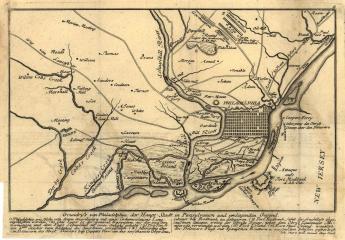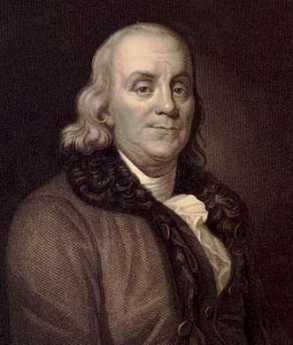Related Topics
Colonial Philadelphia (Pre- 1776)
 It's surprising to most Americans to learn the American Revolution was not the beginning, but almost half-way through the European settlement. And before the Revolution, there were thousands of years of settlement by non-European tribes. We know more about non-European settlers than we did fifty years ago, but records are still very poor or non-existent, and not likely to catch up very rapidly. History will begin in 1492 for a very long time. Long before that, it isn't history, it's anthropology.
It's surprising to most Americans to learn the American Revolution was not the beginning, but almost half-way through the European settlement. And before the Revolution, there were thousands of years of settlement by non-European tribes. We know more about non-European settlers than we did fifty years ago, but records are still very poor or non-existent, and not likely to catch up very rapidly. History will begin in 1492 for a very long time. Long before that, it isn't history, it's anthropology.
Benjamin Franklin
A collection of Benjamin Franklin tidbits that relate Philadelphia's revolutionary prelate to his moving around the city, the colonies, and the world.

Franklin Inn Club
Hidden in a back alley near the theaters, this little club is the center of the City's literary circle. It enjoys outstanding food in surroundings which suggest Samuel Johnson's club in London.
Philadelphia Politics
Originally, politics had to do with the Proprietors, then the immigrants, then the King of England, then the establishment of the nation. Philadelphia first perfected the big-city political machine, which centers on bulk payments from utilities to the boss politician rather than small graft payments to individual office holders. More efficient that way.
Quakers: The Society of Friends
According to an old Quaker joke, the Holy Trinity consists of the fatherhood of God, the brotherhood of man, and the neighborhood of Philadelphia.
Particular Sights to See:Center City
Taxi drivers tell tourists that Center City is a "shining city on a hill". During the Industrial Era, the city almost urbanized out to the county line, and then retreated. Right now, the urban center is surrounded by a semi-deserted ring of former factories.
Benjamin Franklin: Chronology

|
| Ben Franklin on the cover of Time magazine |
January 17, 1706 Born in Boston, the thirteenth child of a candle maker; only went through 2nd Grade, Apprenticed to his brother as a printer, ran away to Philadelphia age 17 .
1723 Arrived in Philadelphia penniless, readily found work as a printer.
1725-26 First trip to England. Researched printing equipment, but probably lived a riotous life.
1726-1748 Returned to Philadelphia to found his own print shop and bookstore. Wrote and printed Poor Richard's Almanack organized local tradesmen into the Junto, formed partnerships with sixty printers throughout the colonies, obtained the print business of local governments, became postmaster. Able to retire at the age of 42 by selling his business for 18 annual payments, which offered him comfort and ease for considerably longer than his life expectancy.
-------------------------------------------------------------------------------
1751 Helped found Pennsylvania Hospital. Entered the legislature.
1751-1757 Active in legislature, rising to leadership during the French and Indian War, Pontiac's Rebellion and the uprising of the Paxtang Boys.
1754Took a noteworthy carriage trip to the Albany Conference, accompanied by fellow delegates Proprietor Penn and Isaac Norris at which he proposed unification of the thirteen colonies to fight against the French. Composed the first political cartoon "Join or Die" for that purpose. Notes for the trip on the blank pages of "Poor Richard's Almanac", now at Rosenbach Museum. The other delegates rejected the plan.
1757-1762 Second time in England. Acted as representative of both Pennsylvania and Massachusetts. After his electoral defeat, he returned to England for a total of eighteen years, suggesting hidden British sympathies may have been present. .
1762-1764 Returned to Pennsylvania Legislature, where his unpopular agitation for replacing the Penn Proprietors with direct Royal government led to his electoral defeat and the end of his elective career. The defeated but determined Quaker party sent him to England to lobby against the Penn family and for the rule of Pennsylvania by the King.
1764-1775 Third British visit. Although unsuccessful in his lobbying, his fame as a scientist made him welcome among the famous members of the Enlightenment, like Hume, Adam Smith, Mozart. Meanwhile, the colonies became considerably more rebellious than he was. His blunder with the publication of some letters gave the British Ministry an opportunity to humiliate and disgrace him in public, probably as a warning to the mutinous New England leaders. It irreconcilably alienated Franklin, who sulked, then packed up and joined the Continental Congress the day he arrived back home.
March, 1775-October, 1776 Brief but fateful return to America. Decisions were made in London to put down the colonists by as much force as necessary. Meanwhile, Franklin persuaded the Continental Congress they must declare independence from England if they expected help from the French.
July 4, 1776, Independence is declared within days after the arrival of a massive British fleet in New York harbor. Franklin dispatched to France to secure the assistance he was confident he could get.
1777-1785 France. Franklin served admirably as American ambassador, his wit and charm persuading the French to overextend themselves with ships, supplies, and money, and very likely contributing to the French Revolution by popularizing the American one.
1785-1790 Returning as a national hero for his final five years of life, Franklin loaned his personal influence to the constitutional convention, became President of Pennsylvania, worked for the abolition of slavery.
April 17, 1790 Died, probably of complications associated with kidney stones.
Originally published: Sunday, September 03, 2006; most-recently modified: Friday, September 20, 2019